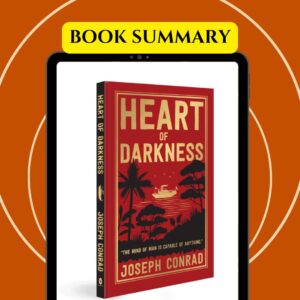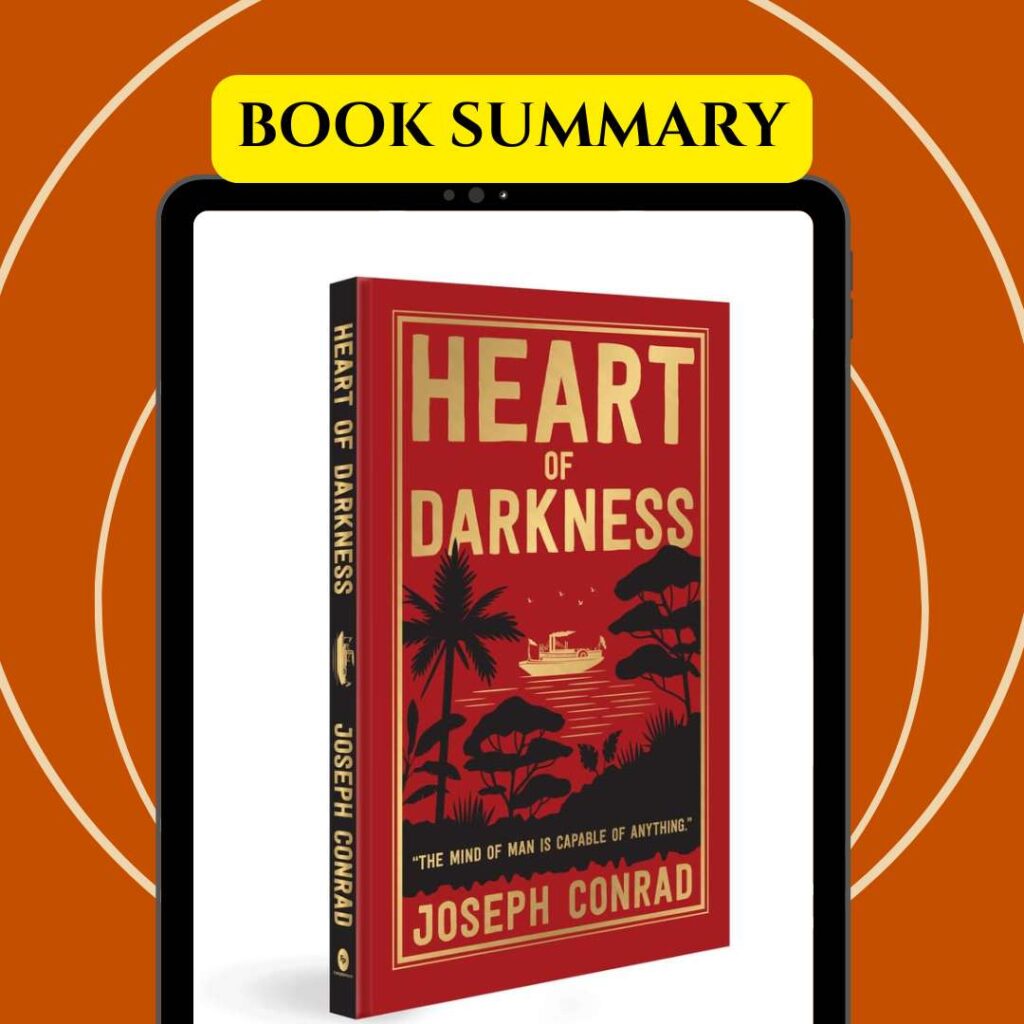Heart of Darkness Summary
Heart of Darkness by Joseph Conrad is a seminal work of literature that delves into the dark heart of colonialism, exploring themes of imperialism, human nature, and the interconnectedness between light and darkness. In this summary, we will provide a comprehensive overview of the novel, its main characters, plot, themes, symbolism, critical reception, and impact on literature and culture.
Background of Heart of Darkness

Author Information
Joseph Conrad: A Polish-British writer known for his exploration of human psychology and moral dilemmas in the context of imperialism. Conrad’s personal experiences as a sailor greatly influenced his writing.
Context of When the Novel Was Written
Written in 1899, the novel reflects the era of European colonialism in Africa, shedding light on the exploitation and brutality that characterized this period.
Geographical Setting of Heart of Darkness
The story is set in the heart of Africa, along the Congo River, where the protagonist, Marlow, embarks on a journey that leads him to confront the darkness lurking within human souls.
Table of Contents
Main Characters in Heart of Darkness
Marlow
The protagonist and narrator of the story, Marlow is a sailor who undertakes a journey into the Congo, where he witnesses the horrors of colonialism and the descent into darkness.
Kurtz
An enigmatic figure revered by the natives, Kurtz embodies the extremes of human nature, oscillating between enlightenment and madness in the heart of the African wilderness.
The Manager
A symbol of the bureaucratic machinery of colonialism, the Manager represents the ruthless pursuit of profit and power at the expense of human life and morality.
The Intended
Kurtz’s fiancée back in Europe, the Intended remains an idealized figure representing the purity and naivety of civilized society, contrasting with the darkness of the Congo.
The Harlequin
A disciple of Kurtz, the Harlequin serves as a mirror reflecting the impact of Kurtz’s charisma and power on those who come under his sway.
Plot Summary
Marlow’s Journey to the Congo
Marlow undertakes a voyage into the heart of Africa on a steamboat, where he witnesses the brutalities of colonial exploitation and encounters the dehumanizing effects of imperialism.
Encounter with the Natives
Marlow confronts the atrocities committed against the native population by the European colonizers, highlighting the inherent darkness within the human soul when stripped of civilization’s constraints.
Discovery of Kurtz
Marlow finally meets Kurtz, a complex and magnetic figure who oscillates between brilliance and madness, revealing the corrupting influence of power and isolation in the wilderness.
Kurtz’s Downfall
Kurtz’s descent into savagery and obsession with power ultimately leads to his demise, showcasing the destructive force of unchecked ambition and the erosion of moral boundaries.
Return to Civilization
Marlow returns to Europe, haunted by the darkness he encountered in the heart of Africa, questioning the values of civilization and the true nature of humanity.
Themes in Heart of Darkness
Imperialism and Colonialism
Conrad critiques the oppressive nature of European imperialism and its devastating impact on both colonizers and colonized, exposing the moral decay at the core of colonial enterprises.
Darkness and Light
The interplay between darkness and light serves as a metaphor for the duality of human nature, highlighting the capacity for both enlightenment and depravity within individuals.
Ambiguity of Truth
The novel explores the elusive nature of truth, blurring the lines between reality and perception, challenging the reader to question their assumptions about morality and civilization.
Human Nature
Through the characters of Kurtz and Marlow, Conrad delves into the depths of human nature, revealing the fragility of morality in the face of power, greed, and isolation.
Civilization vs. Savagery
The contrast between civilized society and the wildness of the African jungle underscores the thin veneer of civilization and the primal instincts that lurk beneath societal norms.
Symbolism in Heart of Darkness
The Congo River
Symbolizing the journey into the depths of the human psyche and the heart of darkness, the Congo River represents the path to self-discovery and moral reckoning.
Kurtz’s Station
Kurtz’s remote station, shrouded in darkness and mystery, embodies the isolation and descent into madness that occurs when one is cut off from the restraints of civilization.
Light and Darkness
The juxtaposition of light and darkness reflects the moral ambiguity of the characters and situations in the novel, blurring the lines between good and evil.
White and Black
The racial dichotomy between the white colonizers and the black natives serves as a stark reminder of the racial hierarchies perpetuated by imperialism and the dehumanization of the Other.
Critical Reception of Heart of Darkness
Initial Reviews
The novel initially faced mixed reviews, with some critics praising its exploration of existential themes while others condemning its portrayal of Africa and its people as savage and inferior.
Modern Interpretations
Contemporary readers and scholars have reinterpreted the novel through a post-colonial lens, highlighting its critique of imperialism and its relevance to ongoing discussions of power dynamics and cultural representation.
Controversies Surrounding the Novel
The novel has sparked debates about racism, imperialism, and the ethics of representation in literature, leading to ongoing discussions about the complexities of Conrad’s narrative.
Comparison to Other Works
Similarities with Other Colonial Literature
Heart of Darkness shares similarities with other colonial literature in its exploration of the moral dilemmas inherent in imperial ventures and the psychological toll of colonization on both colonizers and the colonized.
Contrasts with Contemporary Novels
In contrast to contemporary novels that romanticize or justify colonialism, Conrad’s work offers a stark critique of the destructive consequences of imperialism and the erosion of moral boundaries in the pursuit of power.
Impact of Heart of Darkness on Literature and Culture
Influence on Modern Writers
Conrad’s novel has inspired countless writers to explore themes of imperialism, colonization, and the darkness within human nature, influencing generations of authors who grapple with the complexities of power and morality.
Adaptations in Film and Television
The novel has been adapted into various film and television adaptations, each offering a unique interpretation of Conrad’s narrative and themes, further solidifying its place in popular culture.
Legacy in Academia
Heart of Darkness remains a staple in academic curricula, providing students and scholars with a lens through which to analyze the complexities of imperialism, cultural representation, and the human condition.
Frequently Asked Questions (FAQs) About Heart of Darkness Summary
What is the main theme of Heart of Darkness?
The main themes explored in Heart of Darkness include imperialism and colonialism, the darkness and light within human nature, the ambiguity of truth, and the clash between civilization and savagery.
Who are the main characters in Heart of Darkness?
Key characters in Heart of Darkness include Marlow, the protagonist who narrates the story, Kurtz, a mysterious and enigmatic figure in the heart of Africa, the Manager, who represents the ruthless nature of colonialism, the Intended, Kurtz’s fiancée back in Europe, and the Harlequin, a devoted follower of Kurtz.
What is the significance of the Congo River in Heart of Darkness?
The Congo River symbolizes both the physical journey that Marlow undertakes and the metaphorical journey into the depths of the human psyche. It represents the darkness and unknown aspects of human nature.
How does Heart of Darkness critique colonialism and imperialism?
Heart of Darkness critiques colonialism and imperialism by showcasing the brutal and dehumanizing effects of European colonization on African people, as well as the moral decay and madness that can result from the pursuit of power and profit.
What is the impact of Heart of Darkness on modern literature?
Heart of Darkness has had a profound influence on modern literature, inspiring numerous adaptations, interpretations, and critical analyses. Its exploration of complex themes and psychological depth continues to resonate with contemporary readers and writers alike.
Is Heart of Darkness a difficult book to read?
Heart of Darkness can be challenging due to its dense prose, complex themes, and ambiguous narrative. However, its profound insights and thought-provoking content make it a rewarding read for those willing to delve into its depths.
Conclusion:
In conclusion, Heart of Darkness remains a timeless masterpiece that delves into the darkest recesses of the human soul and exposes the brutal realities of imperialism and colonialism. Through its rich symbolism, intricate characters, and deep themes, Joseph Conrad’s novel continues to captivate readers and provoke critical discussions on the nature of civilization, power, and morality. For those seeking a thought-provoking and immersive literary experience, Heart of Darkness stands as a seminal work that challenges perceptions and stimulates intellectual inquiry.
Discover marketing services, interviews & publishing tools at SharingStories.




